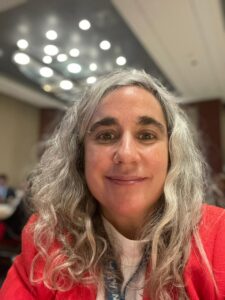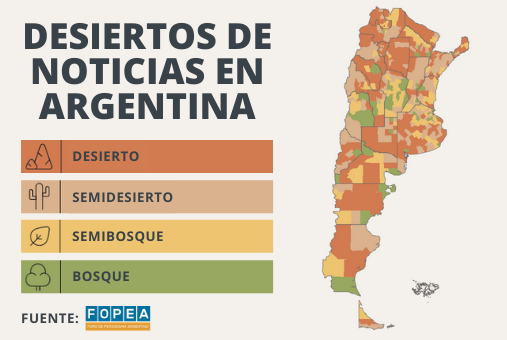Few issues bring together media organizations across the region like the phenomenon of news deserts. The growing movement to understand and find solutions has served as a rallying cry for organizations advocating for free expression.
For Irene Benito, coordinator of new projects at the Argentine Journalism Forum (Fopea for its abbreviation in Spanish), discussing local news deserts is a conversation about the future of journalism.
“We are left with very few voices,” Benito told LatAm Journalism Review (LJR). In 2021, she led the first study on local news deserts in Argentina.
At the time, data showed that 47.9% of the country’s cities and towns lacked independent local media. In Brazil, the Atlas da Notícia found in 2023 that nearly half (48.7%) of municipalities had no local news outlets serving their population. In Colombia, the Foundation for Press Freedom (FLIP) reported in 2019 that 8.8 million people lived in so-called “silent zones.”
The decline of journalism—driven by autocratic regimes fueling anti-media sentiment, alongside a new generation that sees little opportunity in the profession—has exacerbated this situation, Benito said.
Unsurprisingly, with support from the Gabo Foundation, organizations in Argentina, Chile, Colombia, Mexico, and Peru are conducting studies to assess or update the state of local news deserts. At the same time, on February 10, FLIP announced a new alliance with four more organizations to push for public policies addressing the issue.
LJR spoke with Benito, who is once again leading Argentina’s study, using a methodology that has also been adopted in the other participating countries. She discussed the impact of news deserts and potential solutions.
The interview has been edited for brevity and clarity.
LJR: How would you assess the current state of local news deserts?
Irene Benito: I have mixed feelings. On the one hand, there has been significant progress in efforts to understand and counteract local news deserts in Latin America.
When we conducted our first study in 2020–2021, I had to get familiar with the concept because I had only heard about it in passing. Since then, our understanding has advanced rapidly, and this has become one of the issues that unite us as a region.
On the other hand, I see no public policies aimed at mitigating these deserts. That makes me increasingly believe that political leaders simply don’t care.
My hope for this new study is that we can once again draw attention to a problem that should deeply concern politicians. It directly affects democratic public debate, and they should be the first ones invested in ensuring that debate exists.

Irene Benito, coordinator of new projects at the Argentine Journalism Forum (Fopea) and coordinator of the news deserts study in Argentina. (Photo: Courtesy)
LJR: When we talk about silenced areas and news deserts, is there a correlation between small communities and these deserts?
IB: I wouldn’t put it that way. Some places are geographically deserts—human deserts, with very few people—but paradoxically, in these isolated areas, communities have managed to develop local media precisely because they are so cut off that these outlets play a crucial role in communication.
I’d say there are news deserts in big cities. In Latin America, we often see erratic, unplanned urban growth, where the outskirts of cities expand in the worst possible way. New settlements form at the borders of original cities, and these added cities—often home to migrants, people without access to essential goods and services, or those facing extreme vulnerabilities—have large populations with unique challenges. Yet, they lack consistent local news coverage. What little coverage exists is often sporadic, partial, or even stigmatizing.
News deserts are linked to poverty, crises, and places where people don’t have strong ties to the area because they are constantly on the move.
For example, I’m thinking of a place called Añelo. It’s the main town in Vaca Muerta, one of Argentina’s largest oil and gas fields. This area has attracted massive investments, including significant foreign capital. Yet, in a 2020–2021 study, Añelo had almost no local media presence. It was striking to see how so much capital could flow into a place without media outlets to cover such a major development. We believe this may have changed in the four years since that initial study.
But news deserts are also linked to the fractures within journalism itself. In many places, journalism is no longer seen as an attractive profession. I don’t know if younger generations are still as in love with journalism as we were.
Today, there is a great need for entrepreneurial journalists because large media outlets are barely surviving. They are shrinking into smaller, more limited organizations with reduced newsrooms.
LJR: How do you define a local news desert?
IB: News deserts are about more than just the presence or absence of media outlets. The key issue is whether there are adequate conditions for professional journalism to thrive.
A place may have newspapers and journalists, but if all media organizations are state-controlled, if there is no financial independence, or if political power dictates editorial lines, then real journalism cannot flourish. In extreme cases, these factors can lead to self-censorship.
It’s a highly complex issue with many layers.

This is how the map of Argentina looked according to the study led by Benito in 2021 on news deserts in the country
LJR: What are the consequences of local news deserts?
IB: The first consequence is that the public is left unprotected. Journalism is a shield. Citizens lose their defense against those in power, and if something happens to them, they have no one to tell their story, no way to expose what they are going through. We have social media, we have the most advanced technological tools humanity has ever developed for communication, but that is not enough to truly understand what is happening in a place. That is what journalism is for. Journalists are public servants, we serve the people, and I believe we are losing something essential to democracy.
The second consequence is that society becomes more vulnerable to propaganda, advertising, manipulation, and disinformation. Why? Because journalists also have the role of verifying facts. When journalism disappears, people are left at the mercy of those who control propaganda machines.
The third consequence is perhaps more subtle, but I believe it leads to a certain degree of legal insecurity. We have seen it time and again around the world—when journalism is repressed, conditions quickly emerge for autocracies to take hold.
I return to the example of Añelo. It is deeply concerning that there is such a massive influx of investment and economic resources for various activities, yet no journalism to report on what is happening with those investments and the large-scale movement of money and natural resources. That lack of information can create conditions of extreme legal uncertainty and even harm those who are investing. No one is safe from this.
And the fourth consequence is perhaps the most significant: polarization. The destruction of media outlets that once brought society together—primarily newspapers and radio stations—has not been adequately replaced by online platforms. This has fueled polarization, making it increasingly difficult to distinguish truth from falsehood, turning everything into a matter of belief. It becomes friend versus enemy, those in favor versus those against, pushing people toward ideological extremes.
The democratic ideal is a space where different arguments come together, are debated, and synthesized into a shared understanding based on reasoned discussion. I believe this process has been severely damaged.
It is extremely concerning because the places where journalism has been allowed to die are the very places that are shaping our future.
LJR: What solutions could help address this issue?
IB: I think the real question is: what can we do about polarization? If we’re serious about tackling this problem, a key starting point is public policies that foster independent, professional journalism with autonomous reporters in as many places as possible.
Unfortunately, politicians are exploiting the situation to their advantage. What they don’t realize is that this could eventually backfire. Encouraging polarization is like stepping into a void—it can end up consuming them too.
LJR: Besides public policies, for which it seems there’s little interest, what role do citizens and audiences play, given the direct impact on them?
IB: A citizen who wants to stay informed and is concerned about making good decisions should first subscribe and financially support the journalists or media outlets they believe fulfill this role.
In my opinion, the healthiest approach is for those who receive the service to finance it because this ensures the media serves them rather than other interests.
However, there’s an issue we need to reconsider. Large companies moved their advertising from traditional media to social media and search engines. It made sense—those platforms were cheaper, more efficient, and audiences were there. But that’s only one side of the equation. When companies placed ads in a media outlet, they were also helping finance an essential public service—something social media and search engines don’t do. These platforms don’t treat people as citizens; they treat them as consumers.
This ties into my earlier point. Companies seeking profits must reconnect with the media because strong media outlets, in a way, “protect” their investments and ensure legal stability.
A striking example of this was what happened in Russia just before the invasion of Ukraine. Until then, there were still some independent media outlets. But when the invasion began, that tolerance ended. The next day, Starbucks, McDonald's, Apple, and many other companies had to leave Russia. Sure, there were a lot of reasons for their departure, but the underlying issue was that when a government turns fully autocratic, it’s because it has eliminated all checks on its power.
Major investors need to recognize that professional journalism provides a service essential to their ability to do business, and they must reinvest in media if they want to protect their enterprises.
LJR: What can be done to push for public policies, and what should they focus on?
IB: The people do not deliberate or govern directly but through their representatives. Those representatives should also be concerned about the quality of news their communities receive.
There needs to be a reasonable funding mechanism for professional journalism. Journalism has always been considered the fourth estate, yet it is the only “power” that has never had clear state funding. It has always been left in private hands. Of course, public media exist, but they are also disappearing. And even then, there’s a bigger question about the role of public media.
In Argentina, for instance, there are many public media outlets, yet news deserts persist in areas where these outlets operate. That means public media alone don’t solve the problem. Why? Because those in power are often tempted to use these outlets to serve their interests, failing to provide independent journalism. The issue of funding the fourth estate is something we must confront.
In Europe, some laws are emerging to address this. Policymakers are beginning to say, “We’ve always claimed professional journalism is vital to democracy—we can’t let it die.” It would be like letting the legislative or judicial branches collapse.
But this debate is flying under the radar. There is a strong anti-press narrative driven by populist and autocratic leaders who hate journalists—for obvious reasons (laughs). They don’t want scrutiny, criticism, or opposition. And they are succeeding.
LJR: And what role should the media and journalists themselves play?
IB: I believe we need to take full ownership of these news deserts. These are places that hold great significance in national decision-making, and the more we understand them, the better off our societies will be.
In Argentina, we already know that criticizing those in power carries great risk. I think of these communities that are truly defenseless, and I believe our work can help alleviate that. That motivates me—it inspires me to keep going.